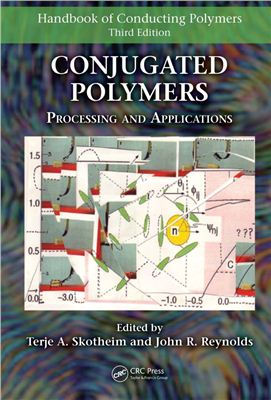3rd ed., CRC Press, Taylor & Francis Group, 2007, Pages: 640
Handbook of Conducting Polymers
Many significant fundamental concepts and practical applications have developed since the publication of the best-selling second edition of the Handbook of Conducting Polymers. Now divided into two books, the third edition continues to retain the excellent expertise of the editors and world-renowned contributors while providing superior coverage of the recent advances in polymer processing and applications, particularly in conductivity, nonlinear optics, and light emission. Conjugated Polymers: Processing and Applications, the second of two volumes, picks up where the first volume ended. It concentrates on the numerous processing methods for conducting polymers and their integration into various devices and applications. The book first examines coating, printing, and spinning methods for complex patteed films and fibers. It then shows how conducting and semiconducting polymers are applied in many devices, such as light-emitting displays, solar cells, field effect transistors, electrochromic panels, charge storage devices, biosensors, and actuators. Following the essential scientific information found in the first installment, this book explores the ways in which polymers are useful in industrial and commercial applications. These application developments have already led to marketable products.
Handbook of Conducting Polymers
Many significant fundamental concepts and practical applications have developed since the publication of the best-selling second edition of the Handbook of Conducting Polymers. Now divided into two books, the third edition continues to retain the excellent expertise of the editors and world-renowned contributors while providing superior coverage of the recent advances in polymer processing and applications, particularly in conductivity, nonlinear optics, and light emission. Conjugated Polymers: Processing and Applications, the second of two volumes, picks up where the first volume ended. It concentrates on the numerous processing methods for conducting polymers and their integration into various devices and applications. The book first examines coating, printing, and spinning methods for complex patteed films and fibers. It then shows how conducting and semiconducting polymers are applied in many devices, such as light-emitting displays, solar cells, field effect transistors, electrochromic panels, charge storage devices, biosensors, and actuators. Following the essential scientific information found in the first installment, this book explores the ways in which polymers are useful in industrial and commercial applications. These application developments have already led to marketable products.

